Trump court appointment an ideological tipping point
Donald Trump is on the cusp of securing his most lasting legacy as US President.
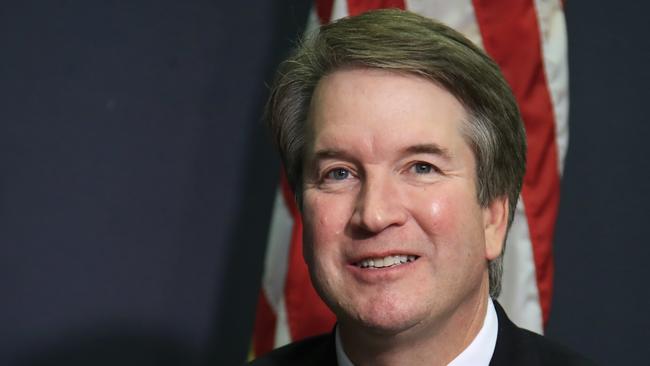
Donald Trump is on the cusp of securing his most lasting legacy as US President as his Supreme Court nominee Brett Kavanaugh fronts a confirmation hearing in Washington tonight.
Democratic senators, fearing the historic ramifications of Kavanaugh’s appointment, will fight the conservative judge with hostile questions from abortion and gun laws to civil rights. But this is the last line of defence for America’s liberals, who now face a generational change in the make-up of the nation’s highest court.
Barring an unexpected revolt against Kavanaugh by centralist Republicans, the 53-year-old seems likely to be confirmed.
If so, he will give the Supreme Court a 5-4 conservative majority, tilting the ideological balance of the court for the next two decades, because the appointment is for life.
“This is a pivotal moment for our country — the person who fills this seat long held by Justice (Anthony) Kennedy will shape the course of American democracy for decades,” says Democratic senator Tina Smith. “I had hoped that the President would appoint a consensus justice, a person ready to protect the rights of all Americans over special interests and groups driven by political ideology.”
Kavanaugh represents the reliably conservative voice Republicans have been looking for to tilt the balance of the court their way on issues from gay rights, gun rights, anti-discrimination laws, civil rights and immigration to, potentially, abortion.
“His judicial record demonstrates a firm understanding of the role of a judge in our republic,” says Republican majority leader Mitch McConnell, “setting aside personal views and political preferences in order to interpret our laws as they are written.”
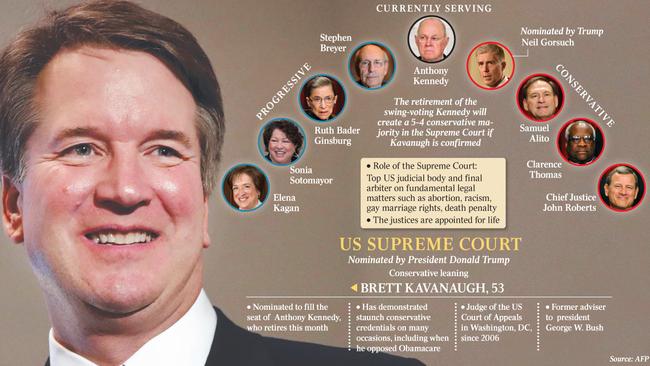
Kavanaugh is a staunch ideological conservative who was associate White House counsel in the George W. Bush administration and also worked with special prosecutor Kenneth Starr during his investigation into then president Bill Clinton in the 1990s.
Kavanaugh wrote a 2009 article in which he said sitting presidents should not be distracted by civil lawsuits, criminal investigations or interviews from prosecutors while in office.
Trump has been furious about special counsel Robert Mueller’s Russia investigation, describing it as a witch-hunt. It has been speculated Trump gravitated to Kavanaugh on the basis of his views about presidents and prosecutors.
Confirmation of Kavanaugh would make him the second Supreme Court judge Trump has appointed in less than two years.
Kavanaugh’s appointment is even more important than that of fellow conservative Neil Gorsuch in April last year.
Gorsuch, 51, replaced the solidly conservative Antonin Scalia, who died in February 2016; a like-for-like replacement. But Kavanaugh is replacing the retiring Kennedy. Although Kennedy, 82, was appointed by Republican president Ronald Reagan, he was in effect a “swing” vote in the court. He often cast the decisive vote in a court that was otherwise split 4-4 between liberals and conservatives. While Kennedy generally voted conservatively, he sometimes dissented from the Right, for example by embracing marriage equality, limiting the scope of the death penalty and acting as a moderate voice on abortion.
Kavanaugh, a Washington insider whose mother was a judge, has given more than 300 opinions during his 12 years on the US District Court of Appeals for the DC Circuit. His solidly conservative interpretations of the law during this time do not suggest he will be a swing voter like Kennedy.
He has impeccable conservative political and legal credentials. After graduating from Yale law school he worked with special prosecutor Starr in the Whitewater investigation.
He was a lead author of the 1998 Starr report, which laid out grounds for the impeachment of Clinton over his cover-up of his relationship with intern Monica Lewinsky.
He then worked in the Bush White House for six years before being appointed in 2006 as a district court judge. It was here that he met his wife, Ashley Estes, then Bush’s personal secretary.
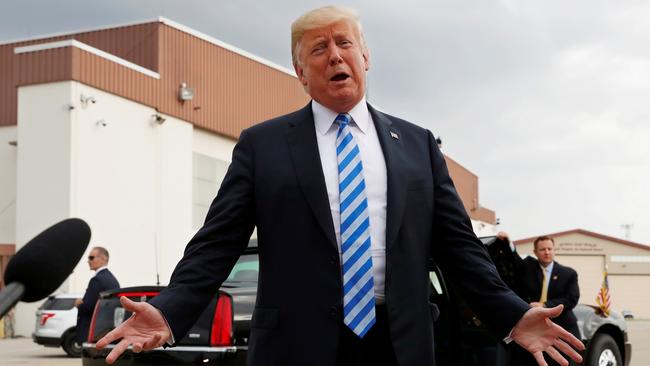
He is a practising Catholic and churchgoer who tutors at a Jesuit school and has two children.
Trump says of Kavanaugh: “Throughout legal circles he’s considered a judge’s judge, one of the sharpest legal minds of our time.’’
Trump campaigned heavily in 2016 on the need for US courts to be more conservative.
On the campaign trail he told his evangelical base there was one reason above all why they should vote for him: “You know why? Supreme Court judges. Supreme Court judges,” Trump said.
He promised to infuse conservative judges not just into the Supreme Court but across the entire US judiciary. So far, he has been remarkably successful.
Trump has had 60 of his judicial nominees confirmed, including 26 to the influential regional courts of appeal. That is a greater number than any president at this stage of their term.
These lower federal courts also shape decisions on immigration, voting rights, abortion and the environment.
For US conservatives, these appointments are one of the most consequential achievements of Trump’s presidency.
“One of the most significant accomplishments in Donald Trump’s first year will serve Americans for decades to come, yet it has received very little fanfare,” McConnell wrote in an op-ed earlier this year.
For liberals, the looming conservative takeover of the Supreme Court is a fearful development. They worry that such a court will seek to weaken hard-won liberal achievements in anti-discrimination laws, gay and civil rights, and environmental protections.
Last weekend a story in the left-leaning New York Times Magazine featured a drawing of the Supreme Court painted in Republican red alongside the question: “What happens when the Supreme Court becomes significantly more conservative than the public?’
The foundations for this conservative legal wave were established in 2016 both on the campaign trail and in the Senate.
During the campaign Trump’s then aide Don McGahn — now his White House counsel — worked with the conservative Federalist Society and Heritage Foundation to select and vet potential conservative nominees for the courts, including the Supreme Court.
In 2016, Trump published a list of 21 Supreme Court contenders so his voters could see their conservative credentials and therefore those of the future president.
At the same time in the Senate, McConnell led his majority Republicans to block Obama’s choice of a liberal judge to replace the conservative Scalia after his death in February 2016. McConnell infuriated Democrats by saying the vacancy would be filled only after the election, once the people had spoken.
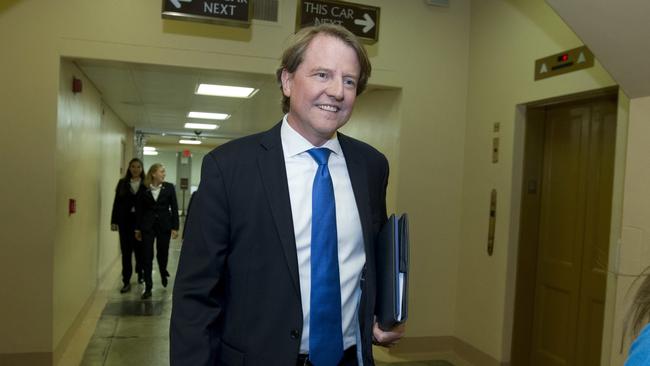
Then last year McConnell changed Senate rules so nominees such as Gorsuch and Kavanaugh could advance to confirmation by a simple majority vote.
In 2016 Republicans also slowed the confirmation of judicial nominees to a crawl, ensuring that if Trump won he would have a record number of judicial vacancies to fill. By the time he was sworn in there were more than 100 such vacancies to fill, double the number Obama inherited from Bush.
Having now tilted the Supreme Court to a 5-4 ideological majority, conservatives have the prospect that Trump will get yet another appointment during his term.
Liberal judge Ruth Bader Ginsburg is 85. Fellow liberal Stephen Breyer is 79. Neither of these Clinton appointees has given any indication they intend to retire soon. Ginsburg has vowed to stay on while Trump remains in office to avoid giving up a liberal position on the court. But age and health could easily conspire against them.
McGahn says the Trump administration wants to fill the judiciary with judges who take an “originalist” approach to constitutional interpretation.
Originalism argues that the US constitution should be interpreted as it was intended when written more than 200 years ago. This lends more weight to a conservative interpretation on contemporary issues such an anti-discrimination laws, labour law and same-sex marriage.
Originalism has been promoted by groups such as the Federalist Society, founded in 1982 to promote conservative viewpoints in law schools and in the judiciary.
Kavanaugh has been a member of that society since 1988.
His likely confirmation has revived speculation that a conservative majority court may seek to reverse the 1973 Roe v Wade ruling that made abortions legal nationwide.
An attack on the landmark ruling has long been an ambition of US conservatives but it would be a hugely contentious move by the court. A Wall Street Journal/NBC poll in July showed 71 per cent of Americans believe Roe v Wade should stay. The court’s ability to challenge Roe v Wade may well depend on Kavanaugh, who has never ruled on abortion law.
Conservatives took heart from a recent decision in which Kavanaugh dissented from an appeals court decision that allowed a pregnant illegal immigrant in federal custody to have an abortion.
He has never said publicly whether he would support overturning Roe v Wade.
However, he told moderate Republican senator Susan Collins last month that Roe was a case of “settled law” — a term seen by many as implying he would not seek to overturn it.
But Democratic minority leader Chuck Schumer, who is pushing his party to block Kavanaugh, said the comment was no guarantee that a new-look court would not challenge Roe v Wade.
Schumer said: “Let’s be clear; this is not as simple as Judge Kavanaugh saying that Roe is settled law.
“Everything the Supreme Court decides is settled law until it unsettles it. Saying a case is settled law is not the same thing as saying a case was correctly decided.”
Ahead of Kavanaugh’s confirmation hearing, both sides of politics have been scrutinising his case history for clues on his views on a wide range of issues.
They will have little luck in studying Kavanaugh’s record during his time in the White House counsel’s office because it was revealed yesterday the Department of Justice has ruled more than 100,000 pages of documents are protected by constitutional privilege, infuriating Democrats.
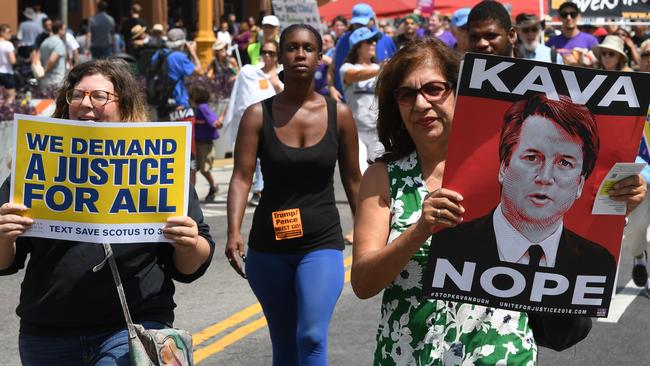
“President Trump’s decision to step in at the last moment and hide 100,000 pages of Judge Kavanaugh’s records from the American public is not only unprecedented in the history of Supreme Court nominations, it has all the makings of a cover-up,” Schumer says.
Kavanaugh has voted for fewer university options for affirmative action and a tougher stance on criminal defendants. He is known to be pro-guns, having opposed a ban on assault rifles, and he has been a strong critic of excessive government regulation, in which he has frequently targeted the Environmental Protection Agency.
He has no record on gay rights or on same-sex marriage, although his conservative views on other issues suggest he is unlikely to be a strong proponent of either.
Bush and Trump do not agree on much, but they do agree on Kavanaugh.
Says Bush of his former White House counsel: “Brett is a brilliant jurist who has faithfully applied the constitution and laws throughout his 12 years on the DC circuit.
“He is a fine husband, father, and friend, and a man of the highest integrity. He will make a superb justice of the Supreme Court of the United States.”
Despite weeks of digging for dirt, Democrats have been unable make a dent on Kavanaugh, who appears to enjoy widespread respect, including among many who don’t like his politics.
This week the Democrats will make their last attempt to block him, but they appear unlikely to succeed. If so, Trump will have made good on his core promise of delivering the Supreme Court to the conservatives, a legacy that will far outlast his presidency.
Cameron Stewart is also US contributor for Sky News Australia




To join the conversation, please log in. Don't have an account? Register
Join the conversation, you are commenting as Logout